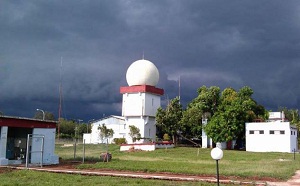 The CubanThe Cuban Institute of Meteorology undertakes important collaboration with other entities in the country, to ensure that decisions taken when faced with severe weather events are backed by scientific research, conducted by its specialists and using the best technology. undertakes important collaboration with other entities in the country, to ensure that decisions taken when faced with severe weather events are backed by scientific research, conducted by its specialists and using the best technology.
The CubanThe Cuban Institute of Meteorology undertakes important collaboration with other entities in the country, to ensure that decisions taken when faced with severe weather events are backed by scientific research, conducted by its specialists and using the best technology. undertakes important collaboration with other entities in the country, to ensure that decisions taken when faced with severe weather events are backed by scientific research, conducted by its specialists and using the best technology.
Celso Pasos, director general of the scientific institution spoke to Granma in this regard, referring to the country’s national weather and climate monitoring network, and the current focus on the drought affecting agricultural production.
We pay a lot of attention, he said, to the short and long-term rainfall forecasts, which impact on crops as well as livestock activities.
“Currently our observations are employed in exchanges with a temporary working group led by the National Institute of Hydraulic Resources in order to analyze the effects of drought in all sectors.”
Pasos explained that highly qualified personnel allow for thorough investigative work to be undertaken, the result of a government strategy which also seeks continuous technological development.
According to the official, Cuba today has some 100 weather observation stations, integrated in a functional network, the result of state efforts and foreign cooperation projects, the latter promoted by the prestige of national meteorologists.
The 31 automated weather stations acquired recently were installed in locations which formerly lacked observation possibilities. These facilitate studies, helping to improve provincial meteorological centers, whose forecast departments have benefited from computers and communications equipment, among other things.
The establishment of mechanisms to generate information for timely decision-making has also been demonstrated, Pasos noted, with the operation of early warning systems, which have been crucial in the provinces of Santiago de Cuba, Holguín, Granma and Las Tunas.
Visiting Holguín for a meeting in which meteorologists from across the country evaluated ways to enhance the effectiveness of their work, the official highlighted the efforts of colleagues in this area, who have conducted important climate and agrometeorological studies, as well as providing services to various sectors of the economy.